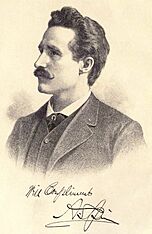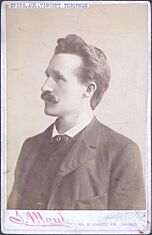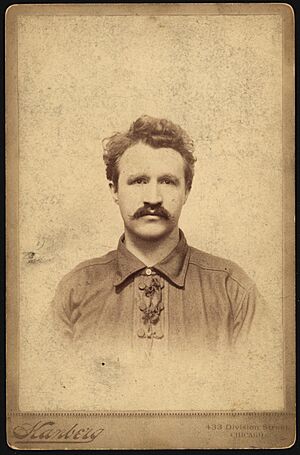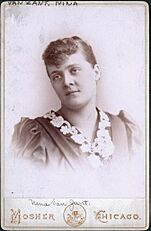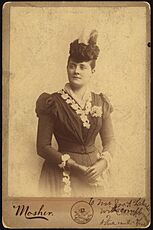August Spies facts for kids
Quick facts for kids
August Spies
|
|
|---|---|
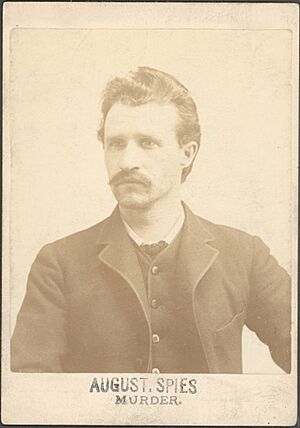
Spies' appearance at the time of his conviction in 1886
|
|
| Born |
August Vincent Theodore Spies
December 10, 1855 Landecker Berg, Electorate of Hesse, German Confederation
|
| Died | November 11, 1887 (aged 31) Cook County Jail, Chicago, Illinois, United States
|
| Cause of death | Execution by hanging |
| Resting place | Forest Home Cemetery |
| Monuments | Haymarket Martyrs' Monument |
| Occupation | Upholsterer, newspaper editor |
| Political party | Socialist Labor Party |
| Criminal charge(s) | Conspiracy to commit murder |
| Criminal penalty | Death |
| Spouse(s) | Nina van Zandt (m. 1887) |
August Vincent Theodore Spies (born December 10, 1855 – died November 11, 1887) was an American upholsterer and newspaper editor. He was also a strong supporter of workers' rights. Spies was found responsible for a bomb attack on police during an event known as the Haymarket affair. He was one of four people who were put to death because of this event.
Early Life
August Spies was born on December 10, 1855, in a old castle on a mountain called Landeckerberg in Germany. His father worked for the government, managing forests.
August remembered having a happy childhood. He had private teachers and was trained to follow in his father's footsteps. But his father died suddenly in 1871. This meant his family no longer had a lot of money. So, August decided to move to America for a new start. He had relatives there who were doing well financially.
Life in Chicago
Spies moved to Chicago and became an upholsterer. He soon became involved in groups that helped workers. He saw many unfair things happening to workers. Because of this, he joined the Socialist Labour Party in 1877.
He became a leader in this party. He helped start a new group called the International Working People's Association in America in 1883. Spies also started working for a newspaper called the Arbeiter-Zeitung in 1880. By 1884, he became its editor.
The Haymarket Affair
On May 3, 1886, August Spies spoke to workers on strike outside the McCormick Harvesting Machine Plant. He told them to "stick together" and support their union. The strike had been mostly peaceful until then.
However, when the workday ended, some workers went to confront those who had crossed the picket line. Even though Spies asked everyone to stay calm, police officers fired into the crowd. Two McCormick workers were killed.
The very next day, May 4, Spies spoke at a rally in Haymarket Square. During this rally, violence broke out, and a bomb was thrown. The explosion and the shooting that followed killed eight police officers and many civilians. Seven men were arrested, including Spies. Later, Albert Parsons also turned himself in.
Witnesses said that none of the eight men who were charged actually threw the bomb. Spies had finished his speech but was still on stage when the bomb exploded. However, all eight men were found responsible for the violence. Seven of them were sentenced to death. One man, Oscar Neebe, was sentenced to 15 years in prison.
The Trial
August Spies was put on trial with seven other men. They were accused of being involved in the death of Officer Mathias Degan. Even though there were some legal issues during the trial, Spies always said he was innocent. He stood by his friends throughout the trial and appeals.
During the trial, the jury was allowed to see articles Spies had written that supported political change. They also heard about his conversations about wanting a revolution. Spies said he had some dynamite because he was curious and wanted to experiment with it. He also said he showed it to reporters to make his stories more exciting.
A witness named Gottfried Waller said that a secret word, "Ruhe" (meaning "peace" or "calm"), was supposed to be published in the Arbeiter Zeitung newspaper. This word would tell supporters to get ready for action. The word appeared in the newspaper on May 4, the day of the bombing. Another witness said the word was written by August Spies.
Another witness, Malvern Thompson, said he saw Spies talking to Michael Schwab before the Haymarket rally. He claimed he heard them talk about needing more "pistols" and about the "police." Thompson also said he saw Spies give something to Rudolph Schnaubelt, who was believed to have thrown the bomb. Another witness, Harry Gilmer, claimed he saw Spies light the fuse for the bomb.
When he was sentenced, Spies said that the police and the witnesses who spoke against him were not telling the truth. He claimed that some witnesses were paid or threatened.
In January 1887, while he was still in prison, Spies married Nina van Zandt (1862–1936). She was from a wealthy family and had gone to Vassar College. She wrote an article about the trial for a newspaper. After Spies died, she married again but later went back to using the name Spies. Nina Spies passed away on April 12, 1936.
Death and Legacy
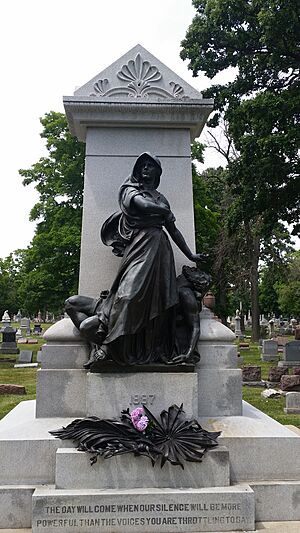
Two of the men, Michael Schwab and Samuel Fielden, asked for mercy. Their sentences were changed to life in prison on November 10, 1887. They were later set free on June 26, 1893, by the governor of Illinois, John Peter Altgeld.
Of the remaining five, Louis Lingg died in his prison cell on November 10, 1887. August Spies, Albert Parsons, Adolph Fischer, and George Engel were put to death the next day, November 11, 1887.
The date May 1 was chosen to celebrate International Workers' Day around the world. This day remembers the events of the Haymarket affair and the fight for workers' rights.
See also
 In Spanish: August Spies para niños
In Spanish: August Spies para niños
- August Spies in the 1880 Census
 | DeHart Hubbard |
 | Wilma Rudolph |
 | Jesse Owens |
 | Jackie Joyner-Kersee |
 | Major Taylor |


